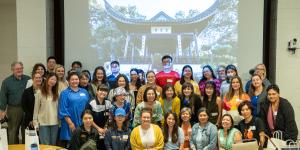On September 29, 2024, the USC U.S.-China Institute hosted a workshop at the Huntington’s Chinese garden, offering K-12 educators hands-on insights into using the garden as a teaching tool. With expert presentations, a guided tour, and new resources, the event explored how Chinese gardens' rich history and cultural significance can be integrated into classrooms. Interested in learning more? Click below for details on the workshop and upcoming programs for educators.
After Global Hollywood: The Prospects and Perils of Chinese Media Capital
The Center for the Study of Global Change at Indiana University presents a talk with Michael Curtin.
Where

Michael Curtin, Visiting Scholar for Framing the Global
Since the 1990s, media imagery has flowed more freely across national borders as a result of new technologies and market liberalization, much to the delight of Western conglomerates that have expanded their operations and exports around the globe. Yet the People’s Republic of China offers a significant counter-example of a government that has been relatively successful at protecting its national media and fostering new domestic enterprises. This has allowed China to exercise political and cultural leadership at home while also expanding its influence abroad. The government has furthermore manipulated Western joint-venture partners—such as Disney, DreamWorks, and News Corp.—to serve its broader strategic ambition, which is to develop media industries that are popular with audiences and ultimately competitive with Hollywood. This case example allows us to explore the implications of Chinese policy within the broader processes of media globalization, providing a framework for understanding the logics of media capital and the challenges for cultural policy. The presentation furthermore makes comparisons to Arab, African, and Indian media, reflecting on the prospects for creativity and cultural diversity in transnational film and television.
Professor Curtin will also participate in the Global Studies Positioning Series (GSPS) on Monday, September 24, 2012. The GSPS will take place from noon to 1:30 p.m. at the Global Center.
For more about Professor Curtin, see Visiting Scholar-In-Residence
Featured Articles
Happy Lunar New Year from the USC US-China Institute!
Events
Ying Zhu looks at new developments for Chinese and global streaming services.
David Zweig examines China's talent recruitment efforts, particularly towards those scientists and engineers who left China for further study. U.S. universities, labs and companies have long brought in talent from China. Are such people still welcome?






